Movies
Lawrence of Arabia
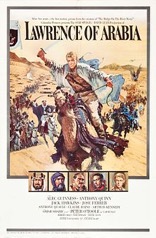 Lawrence of Arabia is a 1962 epic historical drama film based on the life of T. E. Lawrence. It was directed by David Lean and produced by Sam Spiegel through his British company Horizon Pictures, with the screenplay by Robert Bolt and Michael Wilson.
Lawrence of Arabia is a 1962 epic historical drama film based on the life of T. E. Lawrence. It was directed by David Lean and produced by Sam Spiegel through his British company Horizon Pictures, with the screenplay by Robert Bolt and Michael Wilson.
The film stars Peter O’Toole in the title role. It is widely considered one of the greatest and most influential films in the history of cinema. The dramatic score by Maurice Jarre and the Super Panavision 70 cinematography by Freddie Young are also highly acclaimed.
The film was nominated for ten Oscars at the 35th Academy Awards in 1963; it won seven in total: Best Picture, Best Director, Best Original Score, Best Cinematography (Color), Best Art Direction (Color), Best Film Editing and Best Sound Mixing. It also won the Golden Globe Award for Best Motion Picture – Drama and the BAFTA Awards for Best Film and Outstanding British Film.
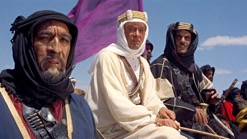 The film depicts Lawrence’s experiences in the Arabian Peninsula during World War I, in particular his attacks on Aqaba and Damascus and his involvement in the Arab National Council.
The film depicts Lawrence’s experiences in the Arabian Peninsula during World War I, in particular his attacks on Aqaba and Damascus and his involvement in the Arab National Council.
Its themes include Lawrence’s emotional struggles with the personal violence inherent in war, his own identity, and his divided allegiance between his native Britain and its army and his new-found comrades within the Arabian desert tribes. As well as O’Toole, the film stars Alec Guinness, Jack Hawkins, Anthony Quinn, Omar Sharif, Anthony Quayle, Claude Rains and Arthur Kennedy.
To Kill a Mockingbird
To Kill a Mockingbird is a 1962 American drama film directed by Robert Mulligan. The screenplay by Horton Foote is based on Harper Lee’s 1960 Pulitzer Prize-winning novel of the same name.
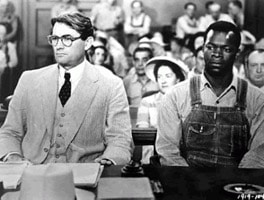 It stars Gregory Peck as Atticus Finch and Mary Badham as Scout.
It stars Gregory Peck as Atticus Finch and Mary Badham as Scout.
The film received overwhelmingly positive reviews from critics and was a box-office success, earning more than 10 times its budget.
The film won three Academy Awards, including Best Actor for Peck, and was nominated for eight, including Best Picture.
The Music Man
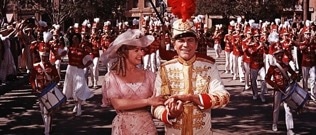 The Music Man is a 1962 American musical film starring Robert Preston as Harold Hill and Shirley Jones as Marian Paroo.
The Music Man is a 1962 American musical film starring Robert Preston as Harold Hill and Shirley Jones as Marian Paroo.
The film is based on the 1957 Broadway musical of the same name by Meredith Wilson. The film was one of the biggest hits of the year and highly acclaimed critically.
Television
Walter Cronkite
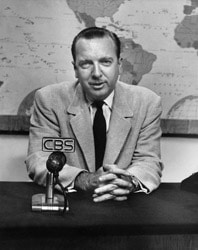
Walter Cronkite became anchorman of the CBS Evening News for 19 years.
Tonight Show starring Johnny Carson
Tonight Show starring Johnny Carson Is a talk show hosted by Johnny Carson under The Tonight Show franchise from October 1, 1962 through May 22, 1992.
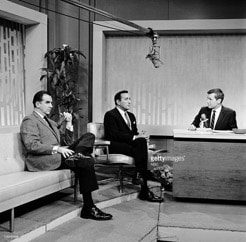 Johnny Carson’s Tonight Show established the modern format of the late-night talk show:[5] a monologue sprinkled with a rapid-fire series of 16 to 22 one-liners (Carson had a rule of no more than three on the same subject) was followed by sketch comedy, then moving on to guest interviews and performances by musicians and stand-up comedians. During the early years of Carson’s tenure, his guests included politicians such as former U.S. Vice President (and future U.S. President) Richard M. Nixon, former U.S. Attorney General Robert F. Kennedy, and Vice President Hubert Humphrey, but by 1970, Carson primarily interviewed as guests people that had a book, movie, television show, or stage performance to promote. Other regulars were selected for their entertainment or information value, in contrast to those who offered more cerebral conversation; Carson refused to discuss politics on The Tonight Show out of concern it might alienate his audience.
Johnny Carson’s Tonight Show established the modern format of the late-night talk show:[5] a monologue sprinkled with a rapid-fire series of 16 to 22 one-liners (Carson had a rule of no more than three on the same subject) was followed by sketch comedy, then moving on to guest interviews and performances by musicians and stand-up comedians. During the early years of Carson’s tenure, his guests included politicians such as former U.S. Vice President (and future U.S. President) Richard M. Nixon, former U.S. Attorney General Robert F. Kennedy, and Vice President Hubert Humphrey, but by 1970, Carson primarily interviewed as guests people that had a book, movie, television show, or stage performance to promote. Other regulars were selected for their entertainment or information value, in contrast to those who offered more cerebral conversation; Carson refused to discuss politics on The Tonight Show out of concern it might alienate his audience.
Carson’s preference for access to Hollywood stars caused the show’s move to the West Coast on May 1, 1972. When asked about intellectual conversation on Tonight, Carson and his staff invariably cited “Carl Sagan, Paul Ehrlich, Margaret Mead, Gore Vidal, Shana Alexander, Madalyn Murray O’Hair” as guests; one television critic stated, however, “he always presented them as if they were spinach for your diet when he did
Carson almost never socialized with guests before or after the show; frequent interviewee Orson Welles recalled that Tonight employees were astonished when Carson visited Welles’s dressing room to say hello before a show. Unlike his avuncular counterparts Merv Griffin, Mike Douglas, and Dick Cavett, Carson was a comparatively “cool” host who only laughed when genuinely amused and abruptly cut short monotonous or embarrassingly inept interviewees. Mort Sahl recalled, “The producer crouches just off camera and holds up a card that says, ‘Go to commercial.’ So Carson goes to a commercial and the whole team rushes up to his desk to discuss what had gone wrong, like a pit stop at Le Mans.” Actor Robert Blake once compared being interviewed by Carson to “facing the death squad” or “Broadway on opening night.” The publicity value of appearing on Tonight was so great, however, that most guests were willing to subject themselves to the risk
The Beverly Hillbillies
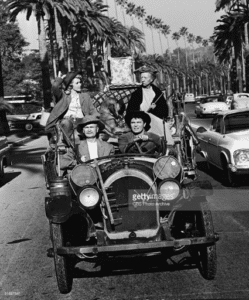 The Beverly Hillbillies is an American sitcom originally broadcast on CBS for nine seasons, from September 26, 1962, to March 23, 1971.
The Beverly Hillbillies is an American sitcom originally broadcast on CBS for nine seasons, from September 26, 1962, to March 23, 1971.
The show had an ensemble cast featuring Buddy Ebsen, Irene Ryan, Donna Douglas, and Max Baer Jr. as a poor backwoods family who move to Beverly Hills, California, after striking oil on their land. The show was produced by Filmways and was created by writer Paul Henning.
It was followed by two other Henning-inspired country-cousin series on CBS: Petticoat Junction, and its spin-off Green Acres, which reversed the rags-to-riches, country-to-city model of The Beverly Hillbillies
Combat
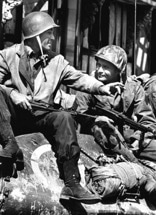 Combat is an American television program that originally aired on ABC from 1962 until 1967. (The exclamation point in Combat! was depicted on-screen as a stylized bayonet.)
Combat is an American television program that originally aired on ABC from 1962 until 1967. (The exclamation point in Combat! was depicted on-screen as a stylized bayonet.)
The show covered the grim lives of a squad of American soldiers fighting the Germans in France during World War II. (The episode “A Day In June” shows D-Day as a flashback, hence the action occurs during and after June 1944).
The program starred Rick Jason as platoon leader Second Lieutenant Gil Hanley and Vic Morrow as Sergeant “Chip” Saunders. The series was unusual in that Jason and Morrow would play the lead in alternating episodes.
McHale’s Navy
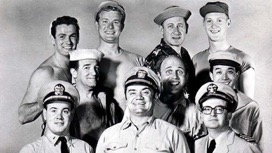 This wacky military service comedy series was set in the Pacific theatre of World War II—for the last season the setting changed to the European theater in Italy—and focused on the loony misfit crew of PT-73, wily boys with crazy antics, led by Lieutenant Commander Quinton McHale, played by Borgnine.
This wacky military service comedy series was set in the Pacific theatre of World War II—for the last season the setting changed to the European theater in Italy—and focused on the loony misfit crew of PT-73, wily boys with crazy antics, led by Lieutenant Commander Quinton McHale, played by Borgnine.
